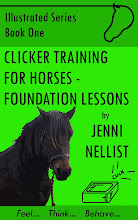Therefore horses are capable of recognising large numbers of individuals, and remembering how those individuals have treated them so that they can respond accordingly.
They can recognise potential predators, and assess the risk of being eaten today from having learned about what predator behaviour constitutes a threat.
And they are incredibly good at learning about their local geography, what to graze, where and when, where water is, even in drought, where to find shelter in a variety of weather conditions, and most importantly, how to travel between these places.
What they are not necesarily capable of is rationalising as we humans do. For example, a horse is unlikely to realise that the carrots given to him ten minutes after the return from a ride were for being brave about a tractor and jumping a particularly challenging obstacle. As far as the horse is concerned, those events and anything associated with them were left back on the ride, and are not present with him whilst relaxing on the yard enjoying his carrots!
Appreciating this is also to appreciate the normal lifestyle and mental faculties of horses, meaning that much of what we ask horses to do, such as live in stables and suppress their flight instinct so we can ride them, are not particularly normal for them at all, even though we frequently expect these things of the horse and more!
When I consider the origins and maintenance of problem behaviour, and how to go about fixing a problem or gaining a more emotionally stable horse most capable of being trained, I have the horse’s natural existence at heart quite simply because a horse struggles to be anything else.
Horses function best when they are managed and trained in a way that is as close as possible to that for which nature designed them. Fortunately there are a variety of means of accomodating the horse's natural behaviour even on yards where the obvious things such as year round turn out and stable herds are limited.
